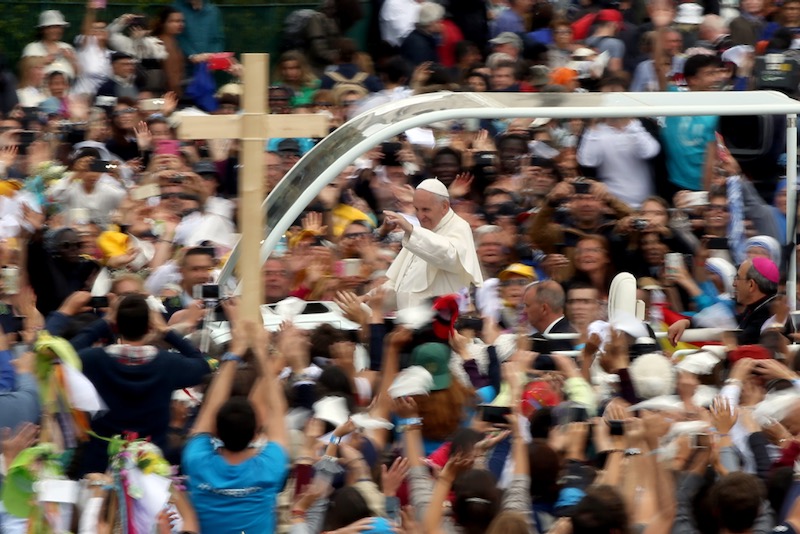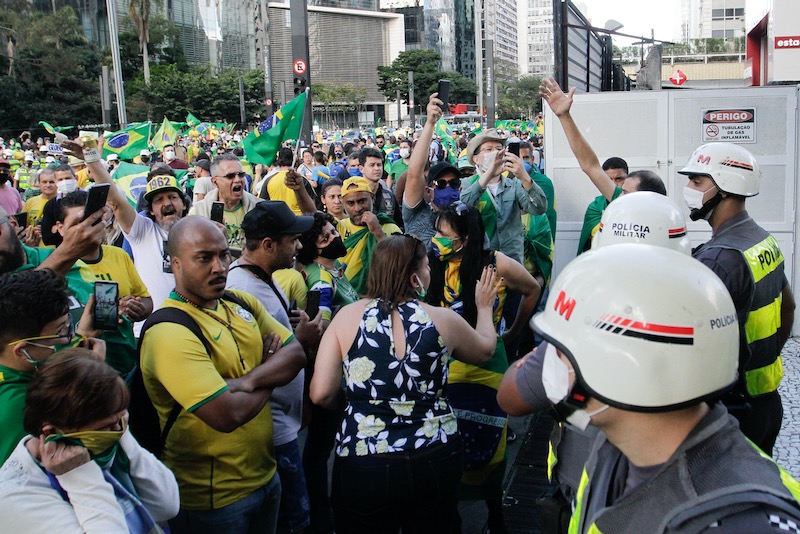In the last week of April there was “a worrying increase” in cases of Covid-19 in Latin America, says Dr Carissa F. Etienne, director of the Panamerican Health Organisation (PHO). The PHO deputy director, Dr Jarbas Barbosa, said that Latin America was like Europe six weeks ago, and that he expected cases to rise further in the next few weeks. And although temperature is not a key factor in the spread of the disease, he fears that the arrival of the southern winter in the next couple of months might increase transmission.
Brazil, with 212 million people the most populous country on the continent, not surprisingly has the largest number of cases, estimated by Baltimore’s Johns Hopkins University on 3 Mayas 102,000 cases with 7,100 deaths. In relative terms, however, calculated per 100,000 of population, Brazil’s pandemic is less severe, at 3.37 deaths, than Peru’s (4.02), Ecuador’s (9.15) or indeed the United Kingdom’s (42.89), but the sight of trenches being dug in cemeteries to accommodate rows of coffins has horrified Brazilians.
The greatest death tolls have been in the densely populated metropolitan centres, São Paulo, the largest and Rio de Janeiro, the second, both of which have densely populated shanty-towns or favelas.
There are also grim figures from some North-Eastern capitals such as Fortaleza and Recife, and Manaus, the capital of Amazonas state has been hard hit. In the Amazon region there is particular concern for the indigenous communities, who normally have less immunity than the rest of the population. Pope Francis phoned the archbishop of Manaus, Mgr Leonardo Steiner, to express his solidarity.
The Brazilian situation has been complicated by the attitude of the President, Jair Bolsonaro, who initially dismissed the virus as “a touch of flu” and when asked about the mounting death toll said “So what?” Bolsonaro has made a public display of ignoring social distancing rules, and on 16 April sacked his health minister, Luiz Henrique Mandetta, who called on people to follow it, in favour of a less challenging figure. Over the long May Day weekend crowds thronged the beaches of Rio.
It is important to note that the official figures are widely regarded as unreliable, partly because of the lack of testing, and in some cases because of government policy. The response of the authoritarian government of Daniel Ortega in Nicaragua, for example, was described by the Lancetas ‘the most erratic of any country in the world’.
Rather than encouraging social isolation, the government called for mass celebrations during Holy Week. It keeps tight control of testing, and banned the bishop of Matagalpa from setting up medical advice centres in his diocese. As a result no-one believes the official figures of 15 cases and five deaths. Projections from Imperial College, London suggest that if no preventive measures are taken, Nicaragua’s death toll could reach more than 20,000.
Of the larger countries in the region, Colombia, with an estimated 8,000 casesand Argentina with 5,000, have managed to keep their rate of deaths per 100,000 people below 1.
Peru, with an estimated 46,000 cases, has nonetheless been praised for the government’s financial support to businesses and individuals.
Mexico’s president, Andrés Manuel López Obrador, has tended to emphasise keeping the economy going, and the country has an estimated 23,000cases. The situation of Ecuador with a population of 17.6 million but 29,000 cases and 1,600 deaths (9.15 per 100,000 people),must be worrying, especially as the government ended the official lock-down as from 4 May. In Ecuador, as in Peru, there is fear for the indigenous populations of the Amazon, where deaths are beginning to occur.
Quotes
We thought ourselves invincible. We were going to quadruple world output in the next three decades. In 2021 would have the highest growth rate in the century so far. We were killing 2,000 species a year, proud of our brutality. We had defined morality as meaning that anything that increases capital is good, and anything that reduces it bad, and governments and armies managed money, but not happiness.
But then suddenly reality appeared. The new coronavirus stripped us of our illusion that we were gods. We were left confused and humiliated as we watched the real numbers rise, those of the infected and the dead. And we don’t know what to do.
We are never completely safe. In a few years we will all be gone, with or without Covid-19. Death’s steamroller will crush all our finery to dust. Pallida mors aequo pulsat pede.‘Pale death knocks at everyone’s door.’ And on the day it arrives no-one will take anything with them. We leave alone. No credit cards, no car, no house. We will leave with what we have been in love, friendship, compassion, and with what we have been in lies, egoism and dishonesty. So we will encounter the mystery and history will remember us or reject us.
And yet to live vulnerability with greatness is to live truly, in solidarity and interdependence, because then we understand that we are all carried by each other, protected by each other. Race, gender, country of origin, social class, religion, none of them matter. That is the message of Covid-19.
Pacho de Roux SJ, former provincial of the Colombian Jesuits
The death rate in the Amazon region is increasing, especially in the big cities, but also in medium-sized cities. The health system is already collapsing in some cities and near to collapse in others. In the face of this pandemic, the authorities have a duty to put in place strategies to care for the most vulnerable sections of the population, our indigenous peoples and many others.
And the Church? The Church, first of all, must get angry, as Pope Francis says, and complain about the great needs and the injustices the people of this region suffer, especially the poorest and most vulnerable, the original inhabitants, the people of African descent and others. At the same time the Church must try to be close to the indigenous peoples in their everyday lives, so that they feel that the Church is on their side, that the Church is an ally who offers consolation and encouragement, prays along with them, strengthens their hope and the will to battle for more justice, more solidarity and the necessities of life.
Cardinal Cláudio Hummes, president of the Church Amazon Network (REPAM)
This pandemic is undermining the foundations of our common life across the world; it is a crisis for biology, economics and our view of human nature, and it is a communications crisis. Against this background Pope Francis tells us that our civilisation has to change, it needs to rethink and renew itself. We are invited to accept our responsibility and face the challenge to create a new humanism, a new way of existing individually and in society. We must therefore encourage an alliance between science, ethics and politics, based on a new pact for life, expressed in a political system that must not be inward-looking but genuinely at the service of all Peruvians, especially the most vulnerable.
The Bishops Conference of Peru
There have been nine deaths of Kokoma people from Covid-19 in the last few weeks. Who will take responsibility for the loss of our elders and teachers?
We, the Kokama people, the original inhabitants of this huge territory of the Upper and Middle Solimões, hereby denounce to the national and international media and the authorities the negligence of the authorities in the fight against Covid-19 in this region.
The cities of Tabatinga, Benjamin Constant and Santo Antônio do Iça, have declared a state of community transmission. The mayor of Tabatinga and the indigenous health authority for the Upper Solimões have told us that the situation is out of control. And we, the Kokama people, are registering deaths every day. We are grieving and desperate.
Glades Kokama Rodrigues, Eládio Kokama Curico, Edney Kokama Samias, authorised representatives of the Kokama people



 Loading ...
Loading ...